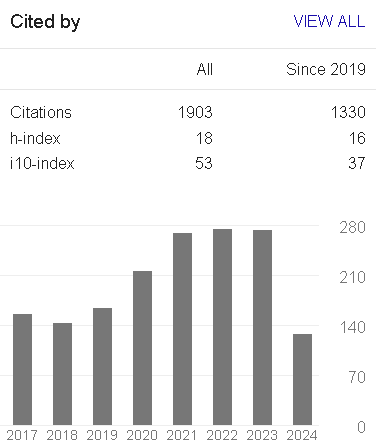Secure Images for Copyright by Watermarking in Transform sphere using bidirectional Neural Network
Keywords:
Digital Watermarking, Transform sphere, Spatial sphere, Neural Network, PSNR, Discrete Cosine Transform (DCT)Abstract
Person beings knowledge a non preventable circumstances of distribution and redistribution their pictures, documents, videos etc on the internet about every week. Intruders are frequently the ones who do not desire to work hard and they maintain on somebody’s original work. watermarking is the process of embedding data called a watermark into a multimedia object such that watermark can be detected or extracted later to make an declaration about the object. Watermarking is adding “ownership” information in multimedia inside to show the dependability. There are generally two most popular ways of embedding the watermark in the digital content i.e. spatial sphere and transform sphere. In spatial sphere, Least-Significant Bit (LSB), SSM Modulation-Based Technique has been developed. For DCT sphere, block based approach and for wavelet sphere, multi-level wavelet transformation technique and CDMA based approaches has been developed. Presented techniques based on spatial and occurrence domain suffer from the problems of low Peak Signal to Noise Ratio (PSNR) of watermark and image quality poverty in unreliable quantity. This paper offers a technique based on Back propagation Neural Network to instruct a given cover image to construct a preferred watermark image.
References
. Chitralekha Dwivedi and Ashish Bansal – “Image Security achieved through Watermarking- Survey based on Spatial and Transform Domain Techniques” UACEE International Journal of Computer Science and its Applications - Volume 2: Issue 3.
. Bansal A and Bhadauria S.S, ― “A novel approach using full counter propagation neural network for watermarking” International journal on Computer Science and Engineering,2010, Vol. 02, pp 289-296.
. Chun-Yu-Chang –“The Application of a Full Counterpropagation Neural Network to Image Watermarking”, 2005, IEEE.
. Ren –Junn Hwand,Chuan-Ho Kao and Rong-Chi Chang, “Watermark in Color Image” in Proc. First International symposium on cyber worlds,2002 ,pp 225-229.
. Chitralekha Dwivedi and Ashish Bansal – “Preventing copyrights infringement of images by Watermarking in transform domain using full counter propagation Neural Network” UACEE International Journal of Computer Science and its Applications - Volume 2: Issue 3 No.6, November 2012
. Chen Chien Chang and Kao De-Sheng ― “DCT Based Reversible Image Watermarking Approach”, Third IEEE International Conference on Intelligent Information Hiding and Multimedia Signal Processing, 2007, pp 1-5
. Bamatraf A, Rosziati Ibrahim, Mohd Salleh, Mohd Najib, “A new digital watermarking algorithm using combination of least significant bit and Inverse Bit”, Journal of Computing, Vol 3, Issue 4, April, 2011,pp 1-8.
. Manjunatha Prasad. R, Dr. Shivaprakash Koliwad ― “A Comprehensive Survey of Contemporary Researches in Watermarking fo Copyright Protection of Digital Images”, International Journal of Computer Science and Network Security (IJCSNS), Vol.9 No.4, April 2009,
pp.91-102.
. Saeed AL-Mansuuri and Alavi Kunhu – “Robust watermarking Technique based on DCT to Protect the Ownership of DubaiSat-I image against Attacks”, IJCSNS International Journal of Computer Science and Network Security, VOL 12 NO. 6, June 2012.
. Narges Ahmidi and Reza Safabakhsh – “A Novel DCT – Based Approach for Secure color Image Watermarking”, ITCC 04 IEEE 2004.
. Cheru Kavadia, Vishal Shrivastava and Mayank Pokharna – “Secured and High Watermarking Techniques”, International Journal on Recent and Innovation in Computing and Communication Vol: 1 Issue : 1 Jan2013.
. Vaishali and Dr, Sachin R. Gengaje – “Literaruture Review of Wavelet Based Digital Image Watermarking Techniques”, International Journal of Computer Applications Vol : 31 No : 1 Oct-2011
. R.Schyndel, A.Tirkel, and C.Osborne, “A Digital Watermark” in Proc.IEEE Int. Conf. on Image Processing,Nov. 1994 ,Vol II,pp.86-90.
. Huang Song , Zhang Wei – “Blind Watermarking Scheme Based on Neural Network”, Proceedings of the 7th World Congress on Intelligent Control and Automation , Chongqing, China , 25 – 27 june, 2008,5985- 5989.
. Hussein J A – “Spatial Domain Watermarking Scheme for colored images based on log Average Luminance”, Journal of computing, Vol 2, Issue 1, Jan 2010,pp 100-103.
. Yang W, Zheng Jin – “An Algorithm for Color Image Watermarking Based On the Combination of DWT and DCT”, Journal of Central South Univers ty of Forestry & Technology, December,2008, pp 139 143.
. Surekha B and Swamy G.N, ― “A spatial domain public image watermarking‘‘, international journal of Security and its applications ,Jan 2011,Vol 5.
. Sengupta M , Mandal J.K – “Self Authentication of Color Images through Discrete Cosine Transformation (SADCT)”, IEEE-International Conference on Recent Trends in Information Technology, ICRTIT 2011 ,832-836.
. Zheng jiang bin,Zhang Yan ning, Feng Da Gan, Zhao Reng chun, ― “Color Image Watermarking Based on DCT-Domains of Color Channels”, Proceedings of IEEE TENCON02, pp 281-284.
. Poljicak A, Mandic L, Agic D ― “Discrete Fourier transform–based watermarking method with an optimal implementation radius”, Journal of Electronic Imaging, Vol 20, Aug 2011.
. Vidyasagar M. Potdar, Song Han, Elizabeth Chang, “A Survey of Digital Image Watermarking Techniques”, 3rd IEEE International Conference on Industrial Informatics (INDIN), 2005, pp.709-713.
Downloads
Published
How to Cite
Issue
Section
License
Copyright (c) 2013 COMPUSOFT: An International Journal of Advanced Computer Technology

This work is licensed under a Creative Commons Attribution 4.0 International License.
©2023. COMPUSOFT: AN INTERNATIONAL OF ADVANCED COMPUTER TECHNOLOGY by COMPUSOFT PUBLICATION is licensed under a Creative Commons Attribution 4.0 International License. Based on a work at COMPUSOFT: AN INTERNATIONAL OF ADVANCED COMPUTER TECHNOLOGY. Permissions beyond the scope of this license may be available at Creative Commons Attribution 4.0 International Public License.


